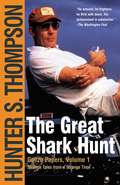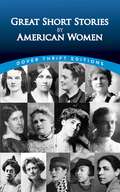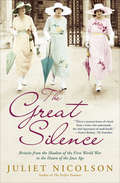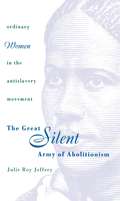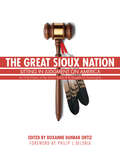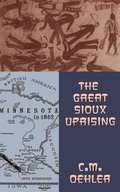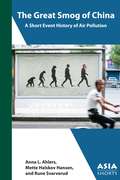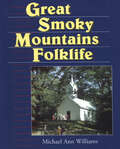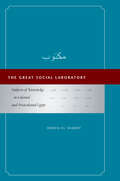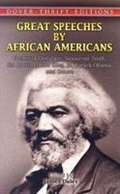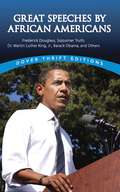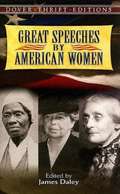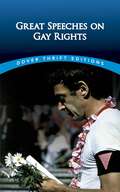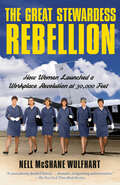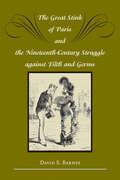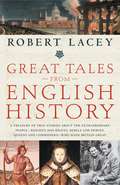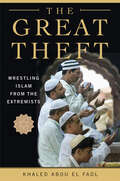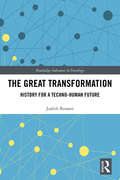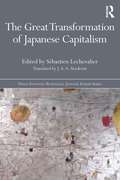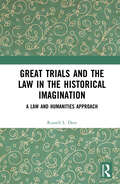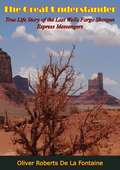- Table View
- List View
The Great Shark Hunt
by Hunter S. ThompsonOriginally published in 1979, the first volume of the bestselling "Gonzo Papers" is now back in print. The Great Shark Hunt is Dr. Hunter S. Thompson's largest and, arguably, most important work, covering Nixon to napalm, Las Vegas to Watergate, Carter to cocaine. These essays offer brilliant commentary and outrageous humor, in signature Thompson style. Ranging in date from the National Observer days to the era of Rolling Stone, The Great Shark Hunt offers myriad, highly charged entries, including the first Hunter S. Thompson piece to be dubbed "gonzo" -- "The Kentucky Derby Is Decadent and Depraved," which appeared in Scanlan's Monthly in 1970. From this essay a new journalistic movement sprang which would change the shape of American letters. Thompson's razor-sharp insight and crystal clarity capture the crazy, hypocritical, degenerate, and redeeming aspects of the explosive and colorful '60s and '70s.
Great Short Stories by American Women (Dover Thrift Editions Ser.)
by Candace WardEmbracing a wide variety of subjects, this choice collection of 13 short stories represents the work of an elite group of American women writing in the 19th and earthly 20th centuries. The earliest stories are Rebecca Harding Davis' naturalistic "Life in the Iron Mills" (published in 1861 and predating ƒmile Zola's Germinal by almost 25 years) and Louisa May Alcott's semiautobiographical tale "Transcendental Wild Oats" (1873). The most recent ones are Zora Neale Hurston's "Sweat," an ironic tale of a failed marriage, published in 1926, and "Sanctuary" (1930), Nella Larsen's gripping and controversial tale of contested loyalty.In between is a grand cavalcade of superbly crafted fiction by Sarah Orne Jewett, Mary E. Wilkins Freeman, Charlotte Perkins Gilman, Kate Chopin, Willa Cather, Alice Dunbar-Nelson, Djuna Barnes, Susan Glaspell and Edith Wharton. Brief biographies of each of the writers are included.
The Great Silence: Britain from the Shadow of the First World War to the Dawn of the Jazz Age
by Juliet NicolsonThis account of British life in the wake of World War I is &“social history at its very best . . . insightful and utterly absorbing&” (Minneapolis Star-Tribune). As the euphoria of Armistice Day in 1918 quickly subsided, there was no denying the carnage that the Great War had left in its wake. Grief and shock overwhelmed the psyche of the British people—but from their despair, new life would slowly emerge. For veterans with faces demolished in the trenches, surgeon Harold Gillies brings hope with his miraculous skin-grafting procedure. Women win the vote, skirt hems leap, and Brits forget their troubles at packed dance halls. And two years later, the remains of a nameless combatant would be laid to rest in the Tomb of the Unknown Soldier at Westminster Abbey, as &“The Great Silence,&” observed in memory of the countless dead, halted citizens in silent reverence. This history of two transformative years in the life of a nation features countless characters, from an aging butler to a pair of newlyweds, from the Prince of Wales to T. E. Lawrence, the real-life Lawrence of Arabia. The Great Silence depicts a nation fighting the forces that threaten to tear it apart and discovering the common bonds that hold it together. &“A pearl of anecdotal history, The Great Silence is a satisfying companion to major studies of World War I and its aftermath . . . as Nicolson proceeds through the familiar stages of grief—denial, anger and acceptance—she gives you a deeper understanding of not only this brief period, but also how war&’s sacrifices don&’t end after the fighting stops.&” —The Seattle Times &“It may make you cry.&” —The Boston Globe
The Great Silent Army of Abolitionism
by Julie Roy JeffreyBy focusing on male leaders of the abolitionist movement, historians have often overlooked the great grassroots army of women who also fought to eliminate slavery. Here, Julie Roy Jeffrey explores the involvement of ordinary women--black and white--in the most significant reform movement prior to the Civil War. She offers a complex and compelling portrait of antebellum women's activism, tracing its changing contours over time. For more than three decades, women raised money, carried petitions, created propaganda, sponsored lecture series, circulated newspapers, supported third-party movements, became public lecturers, and assisted fugitive slaves. Indeed, Jeffrey says, theirs was the day-to-day work that helped to keep abolitionism alive. Drawing from letters, diaries, and institutional records, she uses the words of ordinary women to illuminate the meaning of abolitionism in their lives, the rewards and challenges that their commitment provided, and the anguished personal and public steps that abolitionism sometimes demanded they take. Whatever their position on women's rights, argues Jeffrey, their abolitionist activism was a radical step--one that challenged the political and social status quo as well as conventional gender norms.
The Great Sioux Nation: Sitting in Judgment on America
by Roxanne Dunbar Ortiz&“If the moral issues raised by the Sioux people in the federal courtroom that cold month of December 1974 spark a recognition among the readers of a common destiny of humanity over and above the rules and regulations, the codes and statutes, and the power of the establishment to enforce its will, then the sacrifice of the Sioux people will not have been in vain.&”—Vine Deloria Jr.The Great Sioux Nation: Sitting in Judgment on America is the story of the Sioux Nation&’s fight to regain its land and sovereignty, highlighting the events of 1973–74, including the protest at Wounded Knee. It features pieces by some of the most prominent scholars and Indian activists of the twentieth century, including Vine Deloria Jr., Simon Ortiz, Dennis Banks, Father Peter J. Powell, Russell Means, Raymond DeMallie, and Henry Crow Dog. It also features primary documents and firsthand accounts of the activists&’ work and of the trial.New to this Bison Books edition is a foreword by Philip J. Deloria and an introduction by Roxanne Dunbar Ortiz.
The Great Sioux Uprising
by C. M. OehlerIn August 1862 the Sioux of Minnesota rose up against their white neighbors in the bloodiest massacre in the history of the West, with four times the fatalities of the Battle of Little Big Horn. The Sioux had been viewed by white settlers as a friendly tribe, but in reality they were deeply resentful over the loss of lands, the disappearance of the buffalo, broken treaties, the government's delayed annuity payments, and the refusal of traders to release food to starving Indians. During their week-long rampage the Sioux killed some 800 settlers, took scores of women and children captive, sent tens of thousands of refugees fleeing eastward, and marked the outbreak of a series of wars between whites and Indians over the Great Plains that did not end until nearly thirty years later at a place called Wounded Knee. This book is a gripping but even-handed reconstruction of the lives and deaths of settlers, Indians, traders, agents, and soldiers as they unknowingly created an epic chapter of frontier history.
The Great Smog of China: A Short Event History of Air Pollution (Asia Shorts)
by Anna L. Ahlers Mette Halskov Hansen Rune SvarverudThe Great Smog of China traces Chinese air pollution events dating back to more than 2,000 years ago. Based on the authors’ fieldwork, interviews and text studies, the book offers a short and concise history of selected air pollution incidents that for varying reasons prompted different kinds of responses and forms of engagement in Chinese society. The three authors, from the disciplines of anthropology, China studies and political science, identify traceable incidents of smog and air pollution that have been communicated in different media and came to impact society in various ways. This also informs a discussion of what it takes to transform people’s experiences of health and environmentally related risks of pollution into broader forms of socio-political agency.
Great Smoky Mountains Folklife
by Michael Ann WilliamsThe Great Smoky Mountains, at the border of eastern Tennessee and western North Carolina, are among the highest peaks of the southern Appalachian chain. Although this area shares much with the cultural traditions of all southern Appalachia, the folklife here has been uniquely shaped by historical events, including the Cherokee Removal of the 1830s and the creation of the Great Smoky Mountain National Park a century later. This book surveying the rich folklife of this special place in the American South offers a view of the culture as it has been defined and changed by scholars, missionaries, the federal government, tourists, and people of the region themselves. Here is an overview of the history of a beautiful landscape, one that examines the character typified by its early settlers, by the displacement of the people, and by the manner in which the folklife was discovered and defined during the nineteenth and twentieth centuries. Here also is an examination of various folk traditions and a study of how they have changed and evolved.
The Great Social Laboratory
by Omnia El ShakryEl Shakry (history, U. of California at Davis) provides an account of the engagement of the Egyptian nationalist intellegentsia with European social thought in the late-19th and 20th century. She argues that, in contrast to colonial social-scientific projects that took "natives" as passive objects of observation and embedded them within a racially hierarchical and Euro-centric discourse of civilizational progress, the nationalist elite constructed the collective national subject as unique and educable, both perceived as preconditions for the Egyptian national project. Their social science projects were linked to the land through geography and agriculture and to labor through human geography and demography and were focused on promoting the social welfare of the demographic masses, with "social welfare" meaning the promotion of particularly desired social relations in order to ensure the successful reproduction of labor power and to minimize class antagonisms. Annotation ©2008 Book News, Inc. , Portland, OR (booknews. com)
Great Speeches by African Americans: Frederick Douglass, Sojourner Truth, Dr. Martin Luther King, Jr. , Barack Obama, and Others
by James DaleyThis anthology comprises speeches by influential figures in the history of African-American culture and politics. Contents include the famous "Ain't I a Woman?" speech by Sojourner Truth, Frederick Douglass' immortal "What, to the Slave, Is the Fourth of July?" Martin Luther King, Jr.'s "I Have a Dream," Barack Obama's "Knox College Commencement Address," and many others.
Great Speeches by African Americans: Frederick Douglass, Sojourner Truth, Dr. Martin Luther King, Jr., Barack Obama, and Others (Dover Thrift Editions)
by James DaleyTracing the struggle for freedom and civil rights across two centuries, this anthology comprises speeches by Frederick Douglass, Sojourner Truth, W. E. B. Du Bois, Martin Luther King, Jr., and other influential figures in the history of African-American culture and politics.The collection begins with Henry Highland Garnet's 1843 "An Address to the Slaves of the United States of America," followed by Jermain Wesley Loguen's "I Am a Fugitive Slave," the famous "Ain't I a Woman?" speech by Sojourner Truth, and Frederick Douglass's immortal "What, to the Slave, Is the Fourth of July?" Subsequent orators include John Sweat Rock, John M. Langston, James T. Rapier, Alexander Crummell, Booker T. Washington, Mary Church Terrell, Ida B. Wells-Barnett, Francis J. Grimké, Marcus Garvey, and Mary McLeod Bethune. Martin Luther King, Jr.,'s "I Have a Dream" speech appears here, along with Malcolm X's "The Ballot or The Bullet," Shirley Chisholm's "The Black Woman in Contemporary America," "The Constitution: A Living Document" by Thurgood Marshall, and Barack Obama's "Knox College Commencement Address." Includes 2 selections from the Common Core State Standards Initiative: "I Have a Dream" and "What to the Slave is the Fourth of July."
Great Speeches by American Women
by James DaleyThis book contains 21 legendary speeches from the country's most inspirational female voices, including Sojourner Truth, Susan B. Anthony, Eleanor Roosevelt, Hillary Rodham Clinton, Nancy Pelosi, and many others.
Great Speeches on Gay Rights (Dover Thrift Editions)
by James DaleyThis comprehensive anthology traces the rhetoric of the gay rights movement from the late nineteenth century to the present. It chronicles the progression from its deeply clandestine beginnings to the battle for recognition, through political struggles and victories of the mid-twentieth century to its current position--at the forefront of the mainstream political debate concerning the fight for marriage equality. The speeches include Robert G. Ingersoll's "Address at the Funeral of Walt Whitman"; Harvey Milk's "Hope Speech"; "Civil Liberties: A Progress Report" by Franklin Kameny; Harry Hay's "Unity and More in '84"; and Urvashi Vaid's "Speech at the March on Washington." Suitable for courses on contemporary politics and social issues, this edition is the only available compilation of speeches on gay rights.
The Great Stewardess Rebellion: How Women Launched a Workplace Revolution at 30,000 Feet
by Nell McShane WulfhartThe empowering true story of a group of spirited stewardesses who &“stood up to huge corporations and won, creating momentous change for all working women.&” (Gloria Steinem, co-founder of Ms. magazine)It was the Golden Age of Travel, and everyone wanted in. As flying boomed in the 1960s, women from across the United States applied for jobs as stewardesses. They were drawn to the promise of glamorous jet-setting, the chance to see the world, and an alternative to traditional occupations like homemaking, nursing, and teaching. But as the number of &“stews&” grew, so did their suspicion that the job was not as picture-perfect as the ads would have them believe. &“Sky girls&” had to adhere to strict weight limits at all times; gain a few extra pounds and they&’d be suspended from work. They couldn&’t marry or have children; their makeup, hair, and teeth had to be just so. Girdles were mandatory while stewardesses were on the clock. And, most important, stewardesses had to resign at 32. Eventually the stewardesses began to push back and it&’s thanks to their trailblazing efforts in part that working women have gotten closer to workplace equality today. Nell McShane Wulfhart crafts a rousing narrative of female empowerment, the paradigm-shifting &’60s and &’70s, the labor movement, and the cadre of gutsy women who fought for their rights—and won.
The Great Stink of Paris and the Nineteenth-Century Struggle against Filth and Germs
by David S. BarnesThe scientific and social history surrounding the 1880 incident of a foul odor in Paris and the development of public health culture that followed.Late in the summer of 1880, a wave of odors enveloped large portions of Paris. As the stench lingered, outraged residents feared that the foul air would breed an epidemic. Fifteen years later—when the City of Light was in the grips of another Great Stink—the public conversation about health and disease had changed dramatically. Parisians held their noses and protested, but this time few feared that the odors would spread disease.Historian David S. Barnes examines the birth of a new microbe-centered science of public health during the 1880s and 1890s, when the germ theory of disease burst into public consciousness. Tracing a series of developments in French science, medicine, politics, and culture, Barnes reveals how the science and practice of public health changed during the heyday of the Bacteriological Revolution.Despite its many innovations, however, the new science of germs did not entirely sweep away the older “sanitarian” view of public health. The longstanding conviction that disease could be traced to filthy people, places, and substances remained strong, even as it was translated into the language of bacteriology. Ultimately, the attitudes of physicians and the French public were shaped by political struggles between republicans and the clergy, by aggressive efforts to educate and “civilize” the peasantry, and by long-term shifts in the public’s ability to tolerate the odor of bodily substances.“A well-developed study in medically related social history, it tells an intriguing tale and prompts us to ask how our own cultural contexts affect our views and actions regarding environmental and infectious scourges here and now.” —New England Journal of Medicine“Both a captivating story and a sophisticated historical study. Kudos to Barnes for this valuable and insightful book that both physicians and historians will enjoy.” —Journal of the American Medical Association
Great Tales from English History: The Truth About King Arthur, Lady Godiva, Richard the Lionheart, and More
by Robert LaceyFrom ancient times to the present day, the story of England has been laced with drama, intrigue, courage, and passion-a rich and vibrant narrative of heroes and villains, kings and rebels, artists and highwaymen, bishops and scientists. Now, in Great Tales from English History, Robert Lacey tells those remarkable stories as only a great writer can: combining impeccable accuracy with the timeless drama that has made these stories live for centuries.This volume begins in 7150 BC with the life and death of Cheddar Man and ends in 1381 with Wat Tyler and the Peasants' Revolt. We meet the Greek navigator Pytheas, whose description of the woad-painted Celts yielded pretanniki ("the land of the painted people"), which became the Latin word Britannia. We learn what the storytellers really meant when they described Lady Godiva's "naked" ride through town. And we discover the truth behind the tales of King Arthur and the infamous Hobbehod, later known as Robin Hood.With insight, humor, and fascinating detail, Robert Lacey brings brilliantly to life the stories that made England. From Ethelred the Unready to Richard the Lionheart, the Venerable
The Great Theft: Wrestling Islam from the Extremists
by Khaled Abou El FadlDespite President George W. Bush's assurances that Islam is a peaceful religion and that all good Muslims hunger for democracy, confusion persists and far too many Westerners remain convinced that Muslims and terrorists are synonymous. In the aftermath of the attacks of 9/11, the subsequent wars in Afghanistan and Iraq, and the recent bombings in London, an unprecedented amount of attention has been directed toward Islam and the Muslim world. Yet, even with this increased scrutiny, most of the public discourse regarding Islam revolves around the actions of extremist factions such as the Wahhabis and al-Qa'ida. But what of the Islam we don't hear about?As the second-largest and fastest-growing religion in the world, Islam is deemed by more than a billion Muslims to be a source of serenity and spiritual peace, and a touchstone for moral and ethical guidance. While extremists have an impact upon the religion that is wildly disproportionate to their numbers, moderates constitute the majority of Muslims worldwide. It is this rift between the quiet voice of the moderates and the deafening statements of the extremists that threatens the future of the faith.In The Great Theft, Khaled Abou El Fadl, one of the world's preeminent Islamic scholars, argues that Islam is currently passing through a transformative period no less dramatic than the movements that swept through Europe during the Reformation. At this critical juncture there are two completely opposed worldviews within Islam competing to define this great world religion. The stakes have never been higher, and the future of the Muslim world hangs in the balance.Drawing on the rich tradition of Islamic history and law, The Great Theft is an impassioned defense of Islam against the encroaching power of the extremists. As an accomplished Islamic jurist, Abou El Fadl roots his arguments in long-standing historical legal debates and delineates point by point the beliefs and practices of moderate Muslims, distinguishing these tenets from the corrupting influences of the extremists. From the role of women in Islam to the nature of jihad, from democracy and human rights to terrorism and warfare, Abou El Fadl builds a vital vision for a moderate Islam. At long last, the great majority of Muslims who oppose extremism have a desperately needed voice to help reclaim Islam's great moral tradition.
The Great Transformation: History for a Techno-Human Future (Routledge Advances in Sociology)
by Judith BessantWhile artificial intelligence (AI), robots, bio-technologies and digital media are transforming work, culture, and social life, there is little understanding of or agreement about the scope and significance of this change. This new interpretation of the ‘great transformation’ uses history and evolutionary theory to highlight the momentous shift in human consciousness taking place. Only by learning from recent crises and rejecting technological determinism will governments and communities redesign social arrangements that ensure we all benefit from the new and emerging technologies. The book documents the transformations under way in financial markets, entertainment, and medicine, affecting all aspects of work and social life. It draws on historical sociology and co-evolutionary theory arguing that the radical evolution of human consciousness and social life now under way is comparable with, if not greater than, the agrarian revolution (10000 BCE), the explosion of science, philosophy, and religion in the Axial Age (600 BCE), and the recent Industrial Revolution. Turning to recent major socio-economic crisis, and asking what can be learnt from them, the answer is we cannot afford this time around to repeat the failures of elites and theoretical systems such as economics to attend appropriately to radical change. We need to think beyond the constraints of determinist and reductionist explanations and embrace the idea of deep freedom. This book will appeal to educators, social scientists, policy-makers, business leaders, and students. It concludes with social design principles that can inform deliberative processes and new social arrangements that ensure everyone benefits from the affordances of the new and emerging technologies.
The Great Transformation of Japanese Capitalism (Nissan Institute/Routledge Japanese Studies)
by S J.A.A. StockwinIn the 1980s the performance of Japan’s economy was an international success story, and led many economists to suggest that the 1990s would be a Japanese decade. Today, however, the dominant view is that Japan is inescapably on a downward slope. Rather than focusing on the evolution of the performance of Japanese capitalism, this book reflects on the changes that it has experienced over the past 30 years, and presents a comprehensive analysis of the great transformation of Japanese capitalism from the heights of the 1980s, through the lost decades of the 1990s, and well into the 21st century. This book posits an alternative analysis of the Japanese economic trajectory since the early 1980s, and argues that whereas policies inspired by neo-liberalism have been presented as a solution to the Japanese crisis, these policies have in fact been one of the causes of the problems that Japan has faced over the past 30 years. Crucially, this book seeks to understand the institutional and organisational changes that have characterised Japanese capitalism since the 1980s, and to highlight in comparative perspective, with reference to the ‘neo-liberal moment’, the nature of the transformation of Japanese capitalism. Indeed, the arguments presented in this book go well beyond Japan itself, and examine the diversity of capitalism, notably in continental Europe, which has experienced problems that in many ways are also comparable to those of Japan. The Great Transformation of Japanese Capitalism will appeal to students and scholars of both Japanese politics and economics, as well as those interested in comparative political economy.
Great Transformations
by Mark BlythThis book picks up where Karl Polanyi's study of economic and political change left off. Building upon Polanyi's conception of the double movement, Blyth analyzes the two periods of deep seated institutional change that characterized the twentieth century: the 1930s and the 1970s. Blyth views both sets of changes as part of the same dynamic. In the 1930s labor reacted against the exigencies of the market and demanded state action to mitigate the market's effects by 'embedding liberalism. ' In the 1970s, those who benefited least from such 'embedding' institutions, namely business, reacted against these constraints and sought to overturn that institutional order. Blyth demonstrates the critical role economic ideas played in making institutional change possible. Great Transformations rethinks the relationship between uncertainty, ideas, and interests, achieving profound new insights on how, and under what conditions, institutional change takes place.
Great Trials and the Law in the Historical Imagination: A Law and Humanities Approach
by Russell L. DeesGreat Trials and the Law in the Historical Imagination: A Law and Humanities Approach introduces readers to the history of law and issues in historical, legal, and artistic interpretation by examining six well-known historical trials through works of art that portray them. Great Trials provides readers with an accessible, non-dogmatic introduction to the interdisciplinary ‘law and humanities’ approach to law, legal history, and legal interpretation. By examining how six famous/notorious trials in Western history have been portrayed in six major works of art, the book shows how issues of legal, historical, and artistic interpretation can become intertwined: the different ways we embed law in narrative, how we bring conscious and subconscious conceptions of history to our interpretation of law, and how aesthetic predilections and moral commitments to the law may influence our views of history. The book studies well-known depictions of the trials of Socrates, Cicero, Jesus, Thomas More, the Salem ‘witches’, and John Scopes and provides innovative analyses of those works. The epilogue examines how historical methodology and historical imagination are crucial to both our understanding of the law and our aesthetic choices through various readings of Harper Lee’s beloved character, Atticus Finch. The first book to employ a ‘law and humanities’ approach to delve into the institution of the trial, and what it means in different legal systems at different historical times, this book will appeal to academics, students and others with interests in legal history, law and popular culture and law and the humanities.
The Great Understander: True Life Story of the Last Wells Fargo Shotgun Express Messengers
by Oliver Roberts De La FontaineThis is the true life story of Oliver Roberts de La Fontaine, who was the last of the Wells Fargo Shotgun express messengers. Taken from his notes and journals, the book tells of his days in the early West as a rancher, miner, saloon keeper, gambler, and lawman, including his adventures of coming into contact with stage robbers and other lawless persons in California and Nevada. Later in life, Roberts de la Fontaine came to “The Walter Method,” referring to its promulgator—and compiler of this book—William W. Walter as the “Great Understander.”“In arranging and compiling this true-life story, especial care has been taken to preserve the original wording of the narrative. No attempt has been made to embellish, enlarge or exaggerate the many thrilling experiences related by Mr. de La Fontaine. On the contrary, it is known to me that many of the experiences were far more dangerous and thrilling than explained in the diary, but Mr. de La Fontaine was as modest and good as he was brave and fearless.”
